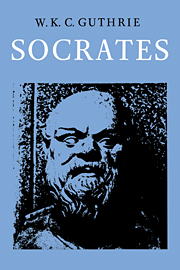III - PHILOSOPHICAL SIGNIFICANCE
Published online by Cambridge University Press: 05 August 2012
Summary
‘PHILOSOPHIA DE CAELO DEVOCATA’
For the Greeks themselves the name of Socrates formed a watershed in the history of their philosophy. The reason they give for this is that he turned men's eyes from the speculations about the nature of the physical world which had been characteristic of the Presocratic period, and concentrated attention on the problems of human life. In the most general terms, his message was that to investigate the origin and ultimate matter of the universe, the composition and motions of the heavenly bodies, the shape of the earth or the causes of natural growth and decay was of far less importance than to understand what it meant to be a human being and for what purpose one was in the world. This estimate of Socrates as a turning-point can be traced to Aristotle, though he does not perhaps give it such incontrovertible support as later writers supposed, and the exaggeratedly schematic view of Greek philosophy which it suggests was the work of the Hellenistic and Graeco-Roman periods. The chief testimonies in Aristotle are these:
(i) In the first chapter of De partibus animalium he is asserting the importance of recognizing the formal–final cause as well as the necessary or material. This had not been clear to earlier thinkers because they had no adequate conception of essence (‘what it is to be’ so-andso) nor of how to define the real being of anything. Democritus had an inkling of it, ‘and in Socrates's time an advance was made as to the method, but the study of nature was given up (εληξε), and philosophers turned their attention to practical goodness and political science’ (642a 28).
- Type
- Chapter
- Information
- A History of Greek Philosophy , pp. 97 - 187Publisher: Cambridge University PressPrint publication year: 1971



